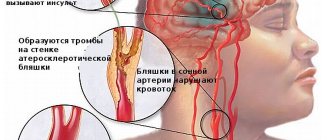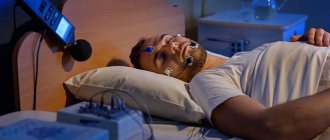As night falls, uncontrollable thoughts about the future, the unknown, and past mistakes appear in your head. The bed seems too hard, the blanket is biting, and the pillow completely interferes with sleep. And if this continues all night, then the diagnosis is obvious - insomnia.
With a one-time lack of sleep, the next day is accompanied by absent-mindedness, poor concentration, fatigue and headaches, but if you can’t sleep almost every night, then serious problems will not take long to appear. Sleep disorders should not be treated negligently, because the consequences of insomnia will cause serious damage to the body.
Causes of insomnia
Modern doctors have not yet clearly understood the causes and mechanisms of insomnia. After all, both young people in love and people of the older generation are susceptible to it. In addition, insomnia is often diagnosed in young children.
That is why the treatment of persistent insomnia requires a mandatory individual approach to each patient, which will allow the patient to regain the ability to fall asleep independently.
The main reasons why a person is not able to fall asleep quickly and normally are as follows:
- a negative side effect of a medicinal product that was prescribed to treat a disease;
- strong emotional shocks;
- frequent occurrence of stressful situations;
- a sudden change in your usual sleep routine;
- bad habits;
- presence of diseases;
- overeating at night, as well as fasting;
- severe mental stress;
- insufficient physical activity.
To better understand what to do with constant insomnia, it is worth taking a closer look at the main causes of its occurrence.
Most often, the inability to fall asleep occurs when a person begins to experience constant stressful situations - financial problems, troubles at work, omissions in the family, serious illnesses of close relatives.
All this can lead to the fact that a person will not be able to fall asleep at night for a long time, and even if this succeeds, the sleep will be heavy and intermittent. As a result, the next morning the person will feel “broken.”
A person who is constantly engaged in mental work often begins to experience brain overstrain, as a result of which he is unable to fall asleep normally at night. Although this theory has not been confirmed by scientists, according to statistics, most often office workers turn to doctors for help with chronic insomnia.
Bad habits such as smoking and drinking alcohol lead to excitation of brain cells, which begin to overreact to all external stimuli. As a result, a person cannot sleep normally.
Since the human brain is responsible for sleep, its injuries, as well as diseases of a nervous and mental nature, can lead to its failure and cause chronic insomnia. In addition, many pathological conditions, such as hypertension, gastrointestinal diseases, infectious pathologies, and itchy dermatitis can contribute to poor sleep, which ultimately causes a new chronic disease.
Since all systems in the human body are closely interconnected, if there are any disturbances, they send signals to the brain. This also includes overeating at night and going to bed with a strong feeling of hunger. All this leads to disruption of normal sleep. If this situation continues day after day, it will cause the development of insomnia.
Also, the inability to fall asleep can be influenced by sleep hygiene factors such as a normal supply of fresh air into the room, a comfortable pillow and a mattress of optimal hardness.
Persen® Look down on stress*
Overwork, anxiety, restlessness, stressful situations, diseases of the nervous system, unhealthy diet, uncomfortable sleeping place or stuffy room, advanced age and failure of the biological clock are just some of the causes of insomnia that require mandatory identification and elimination.
Insomnia or insomnia (from the English term Insomnia
) are various sleep disorders characterized by insufficient duration or unsatisfactory quality, as well as the simultaneous manifestation of these two factors over a long period. The causes of insomnia and the choice of treatment are inextricably linked, therefore, without their identification and medical consultation, folk remedies, herbal preparations and pills for insomnia may be ineffective.
Symptoms and signs of insomnia
Occasional or temporary problems with sleep, which do not exceed two to three days in duration, do not pose a danger to the body. Difficulties falling asleep can be caused by one-time situations associated with nervous tension or anxiety experienced during the day. These problems are mainly caused by external factors1:
- annoying sounds and noise;
- uncomfortable room temperature;
- uncomfortable mattress or pillow;
- foreign odors.
A constant lack of sleep negatively affects not only your appearance, but also your mental and physical well-being. Pathological sleep disturbance is preceded by a number of symptoms. If several of them occur regularly at the same time, you should sound the alarm, find out the causes of insomnia and select treatment.
Symptoms of pathological sleep disorder2:
- appearance deteriorates - the face appears swollen, bruises appear under the eyes;
- depressed mood, feeling of lethargy in the body, absent-mindedness and difficulty concentrating;
- decreased ability to work, slow reaction;
- feeling drowsy and tired throughout the day while reading, working, driving;
- Without several cups of strong coffee and caffeinated drinks, it is difficult for you to concentrate;
- tearfulness, increased emotionality, causeless attacks of aggression, anxiety or anxiety;
- frequent awakenings in the middle of the night, as well as difficulty falling back to sleep;
- sleep seems superficial, fragmented;
- You can’t fall asleep without alcohol or insomnia pills.
Reasons to see a doctor are:
- two or more of the above symptoms noted simultaneously;
- sleep disturbances for 1 month and more often than 3 days a week;
- poor quality and/or short sleep;
- problems in work activity due to inadequate sleep.
To diagnose the cause of insomnia, a comprehensive examination may be required:
- detailed information about the development and symptoms of sleep disorders, living and working conditions, medical history, hereditary factors, stress;
- keeping a “sleep diary”;
- initial examination of the patient to make a preliminary diagnosis;
- filling out a questionnaire on the state of the body systems.
If necessary, the following may be prescribed:
- laboratory diagnostics, including sanitary-hygienic and clinical research methods;
- computer study of the patient’s sleep – polysomnography;
- consultations with several specialists, including a neurologist, gastroenterologist, cardiologist, and psychiatrist.
Causes of insomnia
The causes of insomnia are represented by a combination of several types of factors3:
- poor sleep hygiene, change of place of residence, change in climate or time zone;
- pain syndrome and traumatic brain injury;
- mental disorders, including depressive states;
- metabolic disorders, gastrointestinal tract functioning, unhealthy diet;
- various diseases - problems with the cardiovascular system, lungs, liver, kidneys, nervous and reproductive systems, thyroid gland, as well as dermatoses and intoxication of the body;
- taking certain types of medications - cardiovascular, antipsychotics, corticosteroids and antidepressants;
- pregnancy period, as well as childhood, adolescence and old age;
- hereditary (genetic) predisposition - quite often the tendency to sleep disorders is passed on from parents to children.
Features of insomnia treatment
Often, the problem of insomnia does not require the use of drugs or a special approach to treatment: by giving up coffee, chocolate, alcohol and heavy food 6-8 hours before bedtime or by taking a warm bath, creating a comfortable atmosphere for relaxation and drinking a cup of warm mint tea, you can achieve quality and long sleep.
Medical actions consist of conducting differential diagnostics to identify the cause of insomnia, and only based on its results, therapeutic treatment is selected.
- If the cause is determined to be lack of sleep hygiene, the doctor will provide the necessary instructions. For psychosocial problems, herbal remedies may be sufficient. Additionally, the help of a psychologist or psychotherapist may be required, and methods of relaxation and treatment of emotional disturbances may be prescribed. When somatic, mental and neurological diseases are identified, their treatment is carried out first. Sedatives should not be used without a doctor's prescription.
Remember that the use of medications also requires compliance with additional conditions related to sleep hygiene. To restore normal and healthy sleep, professional medical assistance is necessary, and then the procedures or remedies prescribed to you may be effective.
Source: https://www.persen.ru/articles/prichiny_bessonici/
How to understand that insomnia has developed
All symptoms of chronic insomnia are divided into 3 groups, each of which has its own name:
- Presomnicheskie
They appear before going to bed, when a person has free time to remember a day or pleasant moments, and rethink his own and other people’s actions. All this often leads to the fact that depressive thoughts begin to intensify and normal falling asleep is disrupted.
- Intrasomnic
They occur at night when a person wakes up several times during the night and experiences a strong feeling of fear, anxiety or pain. The occurrence of this situation may be influenced by various environmental factors, including noise from neighbors behind the wall. Gradually, such signs increase and worsen the depth of sleep; it becomes increasingly difficult for a person to fall asleep due to surging thoughts and anxieties.
- Post-somnia
They occur after waking up and last for varying amounts of time, either 10 minutes or throughout the working day. The main signs of this condition are pain in the head, feeling tired, malaise, frequent irritability, and dissatisfaction with night's sleep.
According to many doctors, insomnia is a well-known type of neurosis, and even a glimpse of a person who is not able to sleep fully at night is enough to understand that he is not getting enough sleep. All this negatively affects his physical condition, performance or energy. And the longer the chronic “lack of sleep” lasts, the stronger the problems that arise.
In addition to the main symptoms of insomnia, which were mentioned above, insomnia is also manifested by the following symptoms:
- inability to sleep;
- constantly waking up ahead of time;
- frequent and causeless waking up at night;
- need for alcoholic beverages and sleeping pills.
If this condition is not treated, the person will constantly experience lack of sleep, which will ultimately lead to various chronic diseases.
Drug treatment
Before starting this method of therapy, the doctor must conduct a complete medical examination of the patient. It is strictly forbidden to independently diagnose yourself and prescribe medications, as this can result in the most disastrous consequences.
For example, contraindications to taking sleeping pills are pregnancy, lactation, and sleep-disordered breathing. But despite this, about 15-20% of people suffering from insomnia independently purchase medications to help them sleep and use them constantly.
However, this therapy has its own subtleties, which are known only to the doctor. For example, at the beginning of therapy, the doctor prescribes minimal doses of the medicine, and the course of taking it is quite short (does not exceed 14 days).
This is explained by the fact that sleeping pills can quickly lead to addiction in the body and then they are not able to cure disturbed sleep in a person. But most people unknowingly begin to take increased doses of the drug on their own, which can cause serious side effects for health.
All medications that are used to treat insomnia are divided into 2 groups:
- over-the-counter;
- prescription
Over-the-counter medications include phenobarbital-based drugs such as Corvalol and Valocordin.
The main active component included in their composition improves the nutrition of brain cells, soothes and dilates blood vessels. They should be taken at night, diluting approximately 50 drops in a glass of warm water. However, these are not the most harmless means and they can be addictive.
In addition, over-the-counter remedies for insomnia include:
- Tanakan and Memoplant tablets - improve the functioning of blood vessels, and also normalize sleep and memory;
- Melatonex is an adaptogenic drug that normalizes the internal biological clock, thanks to the hormone melatonin, which is responsible for sleep;
- Novopassit, Persen, Afobazol are sedative medications that will help a person fall asleep faster.
If over-the-counter medications do not help, your doctor may prescribe stronger prescription medications. These include Phenozepam and Donormil. They will help cure insomnia, as well as normalize the condition of men and women, regardless of age.
Attention! Such drugs begin to have a therapeutic effect very quickly, but you should not get carried away with taking them, otherwise it can lead to addiction. It is better to take the medicine according to the instructions, as they have side effects and a number of contraindications.
It is worth noting that almost all sleeping pills have side effects, for example, they have an inhibitory effect on consciousness and cause temporary memory loss. Additional side effects may include:
- deterioration of the body's reactions;
- temporary amnesia after taking the medicine;
- If used incorrectly, insomnia may return at an accelerated rate.
To avoid negative effects on health, it is necessary to take the medicine strictly according to the instructions and only as directed by a doctor.
Elderly people with poor sleep quality are recommended to take the following medications to help them sleep sounder and longer:
- barbiturates;
- antihistamines;
- tranquilizers;
- benzodiazepines.
Doctor's advice: to achieve a positive treatment result, it is advisable to use conservative treatment together with additional methods of treating insomnia.
Why do women often not sleep?
Statistics show that women of any age are several times more likely to suffer from insomnia than men.
And this fact is primarily due to the fact that, by their nature, women are more emotional and experience more deeply even events that seem insignificant to an outsider’s eye, if they are connected with them or their close environment. If a man looks at a problem solely from the point of view of its solution, then a woman “lives” it, and often in a variety of ways - both positive and negative. Naturally, her brain and nervous system are more stressed, and it is more difficult for them to switch off for proper rest. Psychological causes of insomnia in women are considered the main ones.
The second important point is hormonal changes that occur regularly in a woman’s life. Even within a month, depending on the period of the menstrual cycle, the level of hormones in the blood fluctuates in one direction or another. Strong hormonal surges are observed during pregnancy and at the onset of menopause.
Many women use hormonal contraceptives, and choose them independently, without relying on the results of blood tests for hormone levels, which causes an imbalance in the endocrine system. Diseases of the thyroid and pancreas and “women’s diseases” lead to the same consequences.
Women are more likely than men to gain excess body weight. Moreover, if men actively begin to gain weight at a more mature age, after about 35-40 years, women often gain weight during pregnancy and can no longer part with the extra pounds.
But if the BMI exceeds 35, then the risk of developing cardiovascular diseases, diabetes, arthritis and other problems, which in turn provoke insomnia, increases greatly.
Additional treatments
What to do if insomnia is difficult to treat? To do this, you can use the following therapy methods that do not depend on medication:
- try not to sleep during the day;
- walking and traditional teas will help calm a person and also act as a sleeping pill;
- before going to bed, you need to stop mental and physical work an hour before going to bed;
- if a person is unable to sleep, it is recommended to put as much stress on the body as possible during the day in order to accumulate fatigue by the evening;
- Before going to bed, you should not drink strong tea and coffee.
As reviews show, in order to quickly and fully fall asleep, it is recommended to properly prepare the sleeping area - it should be comfortable and cozy. It is also worth turning off the music and bright lights.
By following the above rules, you will be able to return full-fledged sleep, which will again restore a person’s strength, and also give him vigor and good mood.











